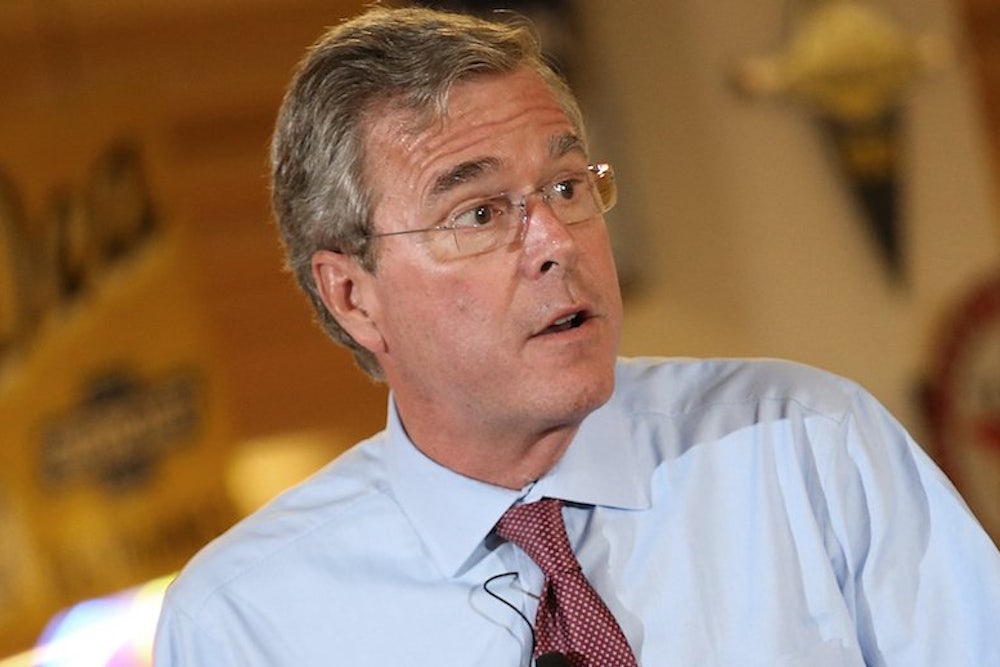We can't know what would have become of Jeb Bush’s presidential candidacy if Donald Trump had never entered the race, or if Bush's campaign could have avoided the damage it's incurred if it had awakened to Trump's durability sooner than it did. What we do know is that the events that actually transpired have left the former Florida governor, ahead of the third primary debate, at an existential crossroad. At this juncture, Bush's vision for his party probably won't survive unless he and the rest of the party establishment can accept three things:
1) that their best hope of stopping Trump, or any candidate similarly reviled by the party establishment, is to consolidate behind a single mainstream candidate;
2) that this can’t happen unless and until Republicans accept that Trump could win the nomination;
3) and that it might require Bush to step aside in short order, and throw his support and fundraising network to a stronger contender.
Bush has not performed well in the debates. He hasn’t figured out how to beat back, or at least neutralize, Donald Trump’s aggressive taunts. He hasn’t escaped, and probably can’t escape, the fact that the last Republican president—widely regarded as one of the worst in U.S. history—is his brother, who’s still alive and whom he still feels compelled to defend.
Combined, these factors have drawn support for Bush down from nearly 20 percent of the GOP electorate to less than 10. The good news for Bush is that, because he's no longer the front-running establishment candidate, the dynamic of this debate should favor him better than previous ones. But if he can’t reverse his slide on Wednesday, or if he exacerbates it, he could do his party a tremendous favor by stepping aside right away.
Trump’s enduring lead in the Republican race, and the fact that only a reactionary neophyte like Ben Carson has been able to dent his support, creates a cruel paradox for the Republican Party. If Trump were an acceptable frontrunner to GOP officials and party donors, the race would be over, or at least much less sprawling and unwieldy than it is.
But most Republican elites aren’t willing to accept, even for the sake of argument, the possibility that Trump will win. Their certitude, or affected certitude, that he will eventually sink keeps every mainstream candidate in the race, because each one can claim that his numbers are artificially depressed by a passing phenomenon—a politically ruinous collective action problem.
This explains why, upon dropping out of the race—or being shoved out by Trump—Wisconsin Governor Scott Walker beseeched others to follow him. “I encourage other Republican presidential candidates to consider doing the same,” he said, “so the voters can focus on a limited number of candidates who can offer a positive conservative alternative to the current frontrunner.”
It’s also why none of them did.
Wednesday's debate will be the first where one of those mainstream candidates, Marco Rubio, enjoys a polling lead over Bush, and as such he’ll likely face persistent attacks not just from Bush but from Trump as well. We can’t know how well he’ll handle the kind of onslaught Bush has already endured, because he’s never had to.
There are technically 14 "serious" candidates remaining in the Republican race, but in a meaningful sense there are only five or six—the conservative and counter-establishment favorites like Trump, Ben Carson, and Ted Cruz, and a center-right placeholder that one of the other 10 candidates is meant to fill. Bush and Rubio are the likeliest to fill it. They’re also, not coincidentally, the two candidates promising most credibly to widen the party’s appeal beyond white conservatives. Bush needs to hope Rubio wobbles Wednesday night, because ultimately no more than one candidate can fill the establishment niche. But if the field doesn’t winnow soon, that role will go unfilled.
